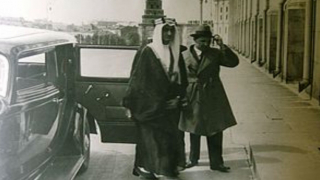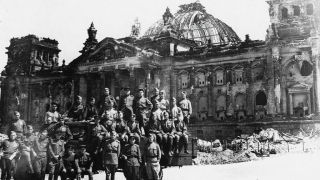Mercader’s Axe, or Rise and Death of the Soviet Union
It is apart from the historical discussion, that the consolidation of the Soviet state ultimately put to an end the vision of the World Revolution, understood as the universal liquidation of the entire political order. From then on, the USSR had already expanded like "normal" statehood or supported and carried out nice coups in other countries, not annihilating this political form in general.
This was the key difference between the statesman Stalin and the revolutionist Trotsky, and therefore throughout the entire existence of the USSR, its destruction was the main goal of Trotskyism, over time repainted in the West as the liberal Neo-conservatism, and in the Eastern Europe as the democratic opposition.
Distinguishing the role of the Soviets as a state from their originally assumed ideological mission accompanied real socialism throughout the entire period of its geopolitical duration. So, when one of its prominent leaders (apocryphal) made a toast "for our true Homeland, the Soviet Union" - he had in mind the vision of the World victory of Communism, in which the Soviet Union would cease to be a state again and became some form of ideological planetary government. As we know, such a moment never happened, and historically the Soviet Union along with progressive de-communization was also subject to systematic etatization (which also entailed negative aspects as well as a natural increase of bureaucracy).
In turn, geopolitically - the USSR, although taking the place of Russia, it was a separate entity, first as an organism that does not represent (only) the Russian ethnos, quite the contrary geared towards maintaining and intensifying the weaker and dependent nations, in the natural process convicted rather on absorption by Russianness (not only the indigenous peoples of Eastern Europe and Asia, but also even Ukrainians or Kazakhs). And secondly, as a more dynamic being than the naturally passive, defensive Russia. Thus, the Soviet Union was not so much Russia (only communist), but an etatized form of Eurasia, especially in the period of geopolitical unity with China.
Again, however, this function of the Soviet Union also weakened in favour of the particularism of the state, the real Eurasian Empire would never withdraw from Iran, would not give up Greece, would not let it break with China, nor would it recognize the continuity of waiting 99 years for intervention in Afghanistan - - and the state understanding of the interests of the USSR has led to everything of these.
The apogee of respecting state interests as the basis of the World system took place in the 1970s, symbolized by the actions of politicians such as the duo Nixon-Kissinger, trio Suslov-Brezhnev-Gromyko and the great single, Mao. What is worth noting - it was also a time when even the dependent states of the Eastern Bloc reached for the attributes of state sovereignty (such as Poland and Romania), and on the Western side they were used, for example, by France. At the same time, non-state and supranational organizations grew stronger - so these are unintelligible bred by the states themselves (like international organizations, with the European Communities in the first line, which - paradoxically - have finally become ... a state), as well as those which first raise the national states and then replace them (like global financial corporations). This tendency ultimatelyprevailed when Nixon left, and it could dominate the United States. Trotskyism lost to Stalinism in the Soviets, but won in America, constantly turning the American state into the power of the World Revolution (which was a simple consequence of the processes taking place in the US at least since the Spanish War, 1898).
The collapse of the Soviet Union not only symbolically, but also practically repeatedly made current the postulate of the apatrid World Revolution. The only thing is, that under changed conditions, this is happening not under the slogan of Communism, but pf Neo-liberal globalization. Despite this difference (consistent with the original goals of some revolutionary inspirators) it is worth noting that we live in the post-triumph of Trotsky (and Parvus...) over Stalin, in addition, in the spirit of historical, irreversible necessity. Just as the USSR's uprising inhibited (also allegedly necessary) the World Revolution – as well today, states remain a value and a being that can and should oppose Globalization, at start even taking over control of their financial systems and the issue of money.
Mercader's axe is still in our hands.








